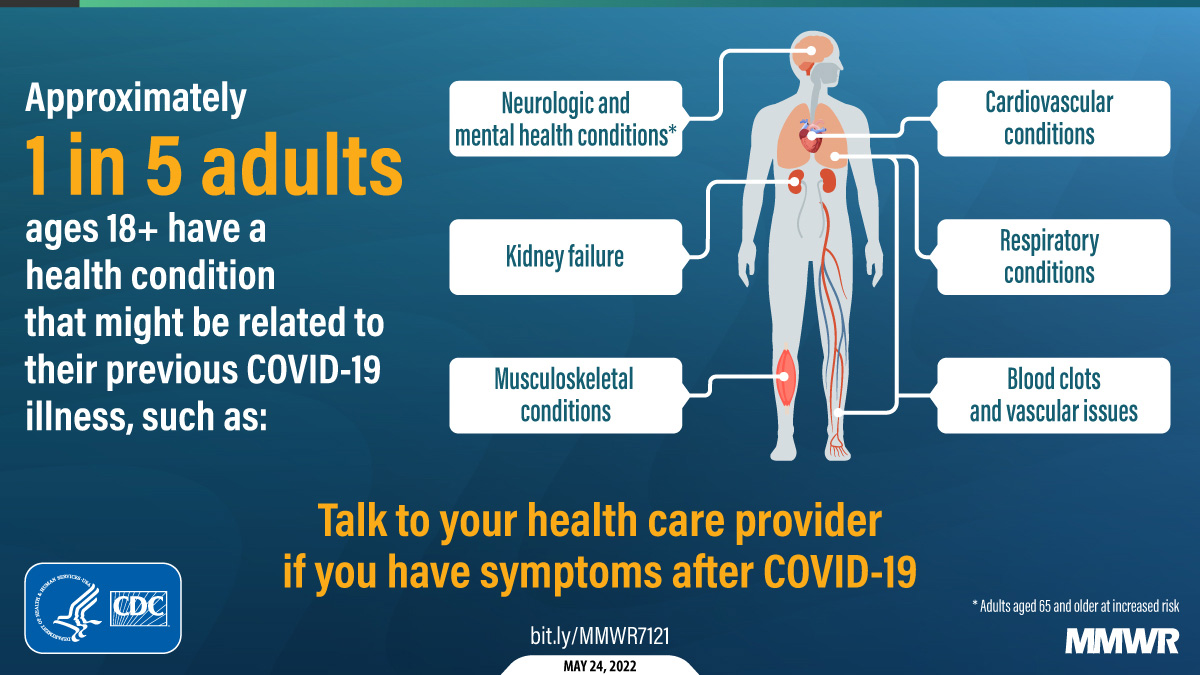 Some people who have been infected with the virus that causes COVID-19 can experience long-term effects from their infection, known as post-COVID conditions (PCC) or long COVID. Here’s what you need to know:
Some people who have been infected with the virus that causes COVID-19 can experience long-term effects from their infection, known as post-COVID conditions (PCC) or long COVID. Here’s what you need to know:
- PCC can include a range of ongoing health problems that can last weeks, months, or longer.
- PCC are found more often in people who had severe COVID-19 illness, but anyone who has been infected with the virus that causes COVID-19 can experience PCC, even people who had mild illness or no symptoms from COVID-19.
- People who are not vaccinated against COVID-19 and become infected might also be at higher risk of developing PCC compared to people who were vaccinated and had breakthrough infections.
- While most people with PCC have evidence of infection or COVID-19 illness, in some cases, a person with PCC may not have tested positive for the virus or known they were infected.
As of July 2021, post-COVID conditions, can be considered a disability under the Americans with Disabilities Act (ADA).
About PCC
There is no test to diagnose PCC, and people may have a wide variety of symptoms that could come from other health problems. This can make it difficult for healthcare providers to recognize PCC. Your healthcare provider considers a diagnosis of PCC based on your health history, including if you had a diagnosis of COVID-19 either by a positive test or by symptoms or exposure, as well as doing a health examination.
People with PCC can have a wide range of symptoms that can last more than four weeks or even months after infection. Sometimes the symptoms can even go away and come back again. PCC may not affect everyone the same way. People with PCC may experience health problems from different types and combinations of symptoms happening over different lengths of time. Most patients’ symptoms slowly improve with time. However, for some people, PCC can last weeks, months, or longer after COVID-19 illness and can sometimes result in disability. People who experience PCC commonly report:
- Tiredness or fatigue that interferes with daily life
- Symptoms that get worse after physical or mental effort
- Fever
- Difficulty breathing or shortness ofbreath
- Cough
- Chest pain
- Fast-beating or pounding heart (also known as heart palpitations)
- Difficulty thinking or concentrating (sometimes referred to as “brainfog”)
- Headache
- Sleep problems
- Dizziness when you stand up
- Pins-and-needles feelings
- Change in smell or taste
- Depression or anxiety
- Diarrhea
- Stomach pain
- Joint or muscle pain
- Rash
- Changes in menstrual cycles
Preventing PPC
The best way to prevent PCC is to protect yourself and others from becoming infected. For people who are eligible, getting vaccinated and staying up to date with vaccines against COVID-19 can help prevent COVID-19 infection and protect against severe illness.
You can find a list of local pharmacies and clinics that offer vaccinations at thewellnesscoalition.org/COVID
